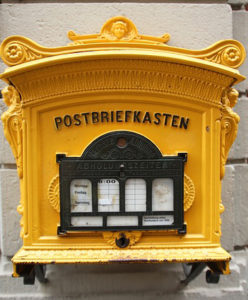The CJEU sees no likelihood of confusion for Deutsche Post AG and its protected earlier trademarks POST, INFOPOST and ePOST by the trademark application InPost. The reasoning shows: if “in” is not used correctly in grammatical terms, it serves to differentiate brands.
Facts of the case

Deutsche Post AG suffered a severe defeat before the Court of Justice of the European Union (CJEU). The Court found that the EU figurative mark application InPost filed by the Polish-based company Inpost sp. z o.o. with the EU Intellectual Property Office (EUIPO) in July 2012 did not constitute a likelihood of confusion or exploitation of the earlier known marks. In November 2012, Deutsche Post AG filed an opposition, invoking both the national earlier word mark “POST” and the earlier EU figurative marks INFOPOST and ePOST.
Plea 1: likelihood of confusion with regard to identical services
The applicant put forward as the first plea in law the likelihood of confusion between the mark applied for and the earlier national word mark POST and between the mark applied for and the earlier EU figurative mark INFOPOST in relation to identical services (infringement of Article 8(1)(b) of Regulation No 207/2009).
The applicant specified its allegation that the figurative element of the mark applied for is not distinctive for the services in question and that the word element „in“ does not lead to any substantial differences between the signs in question. On the contrary, it is precisely the fact that a later mark consists exclusively of an earlier mark and another word element which indicates that the two marks are similar, according to Deutsche Post AG (Judgment of 4 May 2005, Reemark v OHIM – Bluenet (Westlife), T-22/04, EU:T:2005:160). The CJEU did not want to accept this argument, certainly not in this generally interpretable wording.
„Post“ may be similar, but “in” makes the difference
 The CJEU first pointed out, in principle, that the average consumer generally perceives a mark as a whole and does not analyse its various details.
The CJEU first pointed out, in principle, that the average consumer generally perceives a mark as a whole and does not analyse its various details.
In the present case, the Board of Appeal of EUIPO considered that the signs in question were to some extent similar visually, acoustically and conceptually, since they divided the word element “post” but differed by the black and yellow envelope symbol and the word element “in” at the beginning of the mark applied for. In addition, optical differences result from the arrangement of the various elements of the figurative mark.
No special attention is paid to the word element “in”, since it is a preposition and a prefix which are ubiquitous in the German language and therefore have a very low degree of distinctiveness. However, the word element “in” is not used as a preposition or prefix in the mark applied for. Therefore, this combination has a rather abstract meaning, because the combination of the elements “in” and “post” is grammatically unusual for the German consumer and is not perceived as an expression with meaning.
The word element „in“ at the beginning of the word element „inPost“ is even of particular importance in the mark applied for, since, unlike the term “post“, the word element „in“ does not refer to the services concerned and thus contributes substantially to the differentiation of the marks.
Word component “in” and “info” conceptually different
 No likelihood of confusion between the mark applied for and the earlier EU figurative mark INFOPOST: The Court also saw no similarity between the word element „in“ and „info“. The word element „info“ at the beginning of the earlier EU figurative mark INFOPOST is understood by the relevant public as „information“, which gives rise to a conceptual difference between it and the mark applied for.
No likelihood of confusion between the mark applied for and the earlier EU figurative mark INFOPOST: The Court also saw no similarity between the word element „in“ and „info“. The word element „info“ at the beginning of the earlier EU figurative mark INFOPOST is understood by the relevant public as „information“, which gives rise to a conceptual difference between it and the mark applied for.
The CJEU therefore ruled that the signs in question have little similarity but, despite the common element of „post“, they show considerable visual, acoustic and conceptual differences. There is no likelihood of confusion with regard to identical services.
Plea 2: Unfair use of the well-known earlier mark
By its second plea in law, the applicant alleged that the good reputation of the earlier mark had been unfairly exploited (infringement of Article 8(5) of Regulation No 207/2009).
When is an earlier trademark fully protected?
The Court confirmed that the element „post“ is distinctive in its own right by virtue of the registration of the sign POST as an earlier national word mark. However, that did not mean that that element was so distinctive that there was an unrestricted right of opposition to the registration of any subsequent trade mark containing that element.
In order for an earlier trade mark to enjoy the broader protection provided for in Article 8(5) of Regulation No 207/2009, a number of conditions must be met.
- the earlier mark, which is claimed to have a good reputation, must be registered
- the earlier trade mark and the trade mark applied for must be identical or similar
- must be known in the European Union for an earlier EU trademark or in the Member State concerned for an earlier national trademark
- the use of the mark applied for must lead to a risk of unfair use.
- This is differentiated into three different and alternative types of risk:
(i) that use of the mark applied for would be detrimental to the distinctive character of the earlier mark without good reason,
(ii) would be detrimental to the repute of the earlier mark; or
(iii) unfairly exploits the distinctive character or reputation of the earlier mark.
Since these terms are cumulative, failure to comply with any of these terms will be sufficient to render this provision inapplicable.
The European Court pointed out that all the factors to be assessed between the mark applied for and the earlier national word mark POST had been examined when examining the likelihood of confusion between those marks. However, the degree of similarity between the marks and the services and the degree of distinctiveness of the earlier national word mark POST were considered to be weak.
In addition, the Board of Appeal took account of all aspects of the word „post“ in its reasons for the contested decision. The applicant cannot limit the use of the term „post“ to postal services covered by the earlier national word mark POST. Because “Post” is also a German term with a meaning like postal services in general.
The European Court therefore also rejected the second plea. The action brought by Deutsche Post AG was dismissed in full.
Are you interested in national or international brand or trademark protection?
Please take your chance and contact us. Our lawyers are experienced in trademark and patent law, national and international law.
Sources:
Curia Europe: T:2018:384 Deutsche Post AG vs. EUIPO, Verbis Alfa sp. z o.o., EasyPack sp. z o.o.,
Pictures:
3dman_EU /pixabay.com / CCO License
Mikali / pixabay.com / CC0-License








Leave a Reply